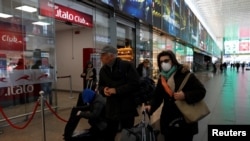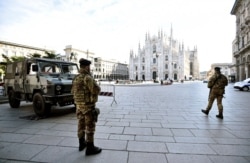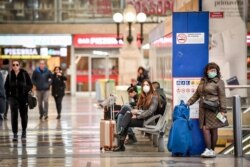Train stations in northern Italy were stormed with thousands of Italians, many of them students, trying to flee the regions of Lombardy and Veneto, ahead of the implementation of a government order Sunday quarantining a swathe of northern Italy, including the cities of Milan and Venice.
The lock-down order, the most dramatic and widespread effort at containing the spread of coronavirus outside China, prompted the fury of regional governors in the south of the country, who warned the exodus risked accelerating the contagion.
They accused the government of Prime Minister Giuseppe Conte of mishandling the lock-down by allowing the draft decree to be leaked to the media ahead of its implementation, and they questioned why train services services and flights weren’t halted in the run-up to its implementation.
The president of the southern region of Puglia, Michele Emiliano, reacted by signing an order of his own requiring anyone arriving from Lombardy and northern provinces badly hit by the virus to quarantine themselves. He urged on social media all those heading to his region, including Apulians, to stop and go back, accusing them of bringing the virus to Puglia. “You are carrying the virus into the lungs of your brothers and sisters, grandparents, uncles, cousins and parents,” he said.
Lazio, anther southern region, followed Puglia's lead and issued Sunday an order requiring anyone who enters the region from the north to notify local authorities of their presence and to observe a home stay until evaluated by public health officials.
The lock-down applies to some 10 million residents in Lombardy — which includes the country’s commercial capital Milan — and another six million living in another 16 northern provinces. Venice, Modena, Parma, Treviso and Venice are included in the order. Previously only 10 towns in Lombardy and one town in the Veneto had been shuttered.
The decree came just hours before the country’s Civil Protection Agency reported another jump in confirmed cases and Coronavirus deaths, from Saturday’s 5,883 to 7,375. The total death toll has also climbed from 233 to 366, a nearly five percent fatality rate and much higher than seen in other stricken countries.
Northern governors also reacted with anger at the unprecedented decree signed overnight, saying they had not been consulted and had no chance to shape the order. The president of the Lombardy region, Attilio Fontano, a member of Matteo Salvini’s populist Lega party, said the proposals “go in the right direction”, but were a “mess.” Some aspects of the decree do not go far enough, he said. And he criticized parts of the decree for being confusing.
His counterpart in the neighboring region of Veneto, Luca Zaia, said: “We have seen these measures at the last minute. We did not help to draw them up, and now we are being asked to give our assent almost at once. It is literally impossible.” He said he had been highly supportive of the government in the battle to halt the spread of the virus. “I have never allowed myself to disagree, even if there were measures that sometimes I would have done in another way.” But he criticized the inclusion of some Veneto provinces he says shouldn’t have been added to the list.
The president of Piedmont, Alberto Cirio, said many mayors shrieked when they learned their towns were included in the decree and are furious they were not updated by the government or forewarned, despite the fact their role will be crucial for the enforcement of the new containment provisions.
From Milan to Venice there was panic and confusion. As news circulated about the upcoming decree, bars and restaurants emptied of customers, many of them heading to grab belongings before rushing to train stations, all fearful of being stuck in the north. At Milan’s central station hundreds of passengers crowded on to trains heading away from the city. Many wore face-masks and gloves. The scene was repeated in stations across the north.
“I read two hours ago that they may be putting out an urgent decree putting Padua in the red zone. Because I would like to return down south to my relatives, I decided to go earlier,” student, Roberto Pagliara told AP.
The mayor of Asti, in the Piedmont region, parts of which are included in the lockdown, posted an furious video on his Facebook page, condemning the government in Rome for not keeping local civic leaders appraised. “Nobody told me,” Maurizio Rasero said.“ It’s incredible that information that is so delicate and important would come out in the newspapers first.”
At a news conference, Prime Minister Conte defended the decree, saying, “I take political responsibility.” He added: “For Lombardy and for the other northern provinces that I have listed, there will be a ban for everybody to move in and out of these territories and also within the same territory,” Conte said. “Exceptions will be allowed only for proven professional needs, exceptional cases and health issues,” he added.
He explained it is not an “absolute ban,” saying, “everything does not stop,” and that trains and planes should continue to run. But the police will be able to question people and ask them why they are moving,” he added. As a political backlash to the order mounted. Conte urged Italians to show responsibility. “We will make it,” he said.
It remains unclear what foreign tourists in the affected areas are meant to do — no mention was made of them in the decree. But a government official told VOA they would likely be allowed to leave, but he was unclear about what bureaucratic hurdles they might have to navigate.
Under the order, which will stay in effect to at least to April 3, bars and restaurants will have to close at 6pm and the owners must ensure customers are at least one meter apart. Anyone with a fever should stay at home and those people asked by local authorities to quarantine at home are strictly prohibited from going out. Fines and jail terms can be imposed on anyone leaving towns or provinces covered by the order.
Amid the criticism from some in Italy over the handling of the lock-down, the head of the World Health Organization, or WHO, Tedros Ghebreyesus, praised Conte. In a tweet, he said: “The government & the people of are taking bold, courageous steps aimed at slowing the spread of the #coronavirus & protecting their country. They are making genuine sacrifices. @WHO stands in solidarity with & is here to continue supporting you.”
In a statement Saturday, WHO called on “all countries to continue efforts that have been effective in limiting the number of cases and slowing the spread of the virus.” It added: “Allowing uncontrolled spread should not be a choice of any government, as it will harm not only the citizens of that country but affect other countries as well.”






